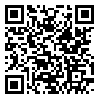مجله رویش روانشناسی از دادن گواهیهای کاغذی معذور است. لطفا تقاضا نکنید. همه گواهی ها در صفحه شخصی کاربران موجود است.
year 13, Issue 8 (automn 2024)
Rooyesh 2024, 13(8): 141-150 |
Back to browse issues page
Download citation:
BibTeX | RIS | EndNote | Medlars | ProCite | Reference Manager | RefWorks
Send citation to:



BibTeX | RIS | EndNote | Medlars | ProCite | Reference Manager | RefWorks
Send citation to:
Firouzan T, Khosropour F, Molaeizarandi H. (2024). Prediction of Social Desirability based on Problem-Oriented Coping Style and Enneagram Personality Types. Rooyesh. 13(8), 141-150.
URL: http://frooyesh.ir/article-1-5666-en.html
URL: http://frooyesh.ir/article-1-5666-en.html
1- PhD student of Psychology, Zarand Branch, Islamic Azad University, Zarand, Iran.
2- Assistant Professor, Department of Psychology, Zarand Branch, Islamic Azad University, Zarand, Iran. ,khosroporfarshid@gmail.com
3- Assistant Professor, Department of Psychology, Zarand Branch, Islamic Azad University, Zarand, Iran.
2- Assistant Professor, Department of Psychology, Zarand Branch, Islamic Azad University, Zarand, Iran. ,
3- Assistant Professor, Department of Psychology, Zarand Branch, Islamic Azad University, Zarand, Iran.
Abstract: (1017 Views)
The purpose of the present study was to predict social desirability based on problem-oriented coping styles and enneagram personality types. The research method was descriptive -correlation. The statistical population was all male and female clients of counseling centers in Kerman City in 2022 and among them, 200 clients were selected as samples by available sampling. The research tools include The nine Enneagram Types Questionnaire (RHETI, 1993); the Social desirability scale (MCSDS, 1960), and the stress coping styles questionnaire (CISS, 1995). Data were analyzed by Pearson correlation coefficient and multiple regression. The results show that positive relationship between peaceful, success-seeking, challenging, helping, reforming, seeking, and enthusiastic personality types with social desirability (P<0.01) and a negative relationship between loyal-skeptic and individualist personality types with social desirability (P<0.01). ) existed. The results also showed There is a positive relationship between peaceful, success-seeking, challenging, helping, reforming, seeking, and enthusiastic personality types with social desirability (P<0.01) and a negative relationship between loyal-skeptic and individualist personality types with social desirability (P<0.01). Also, The results showed that Enneagram personality types and problem-oriented coping can explain the 0.35 variance in social desirability. (p<0.01). In general, it can be said that the problem-oriented coping style enneagram personality types predict social desirability (p<0.01) and through them, social desirability can be determined.
Type of Article: Research |
Subject:
General Psychology
Received: 2024/09/12 | Accepted: 2024/09/22 | ePublished: 2024/11/30
Received: 2024/09/12 | Accepted: 2024/09/22 | ePublished: 2024/11/30
Send email to the article author
| Rights and permissions | |
 |
This work is licensed under a Creative Commons Attribution-NonCommercial 4.0 International License. |





